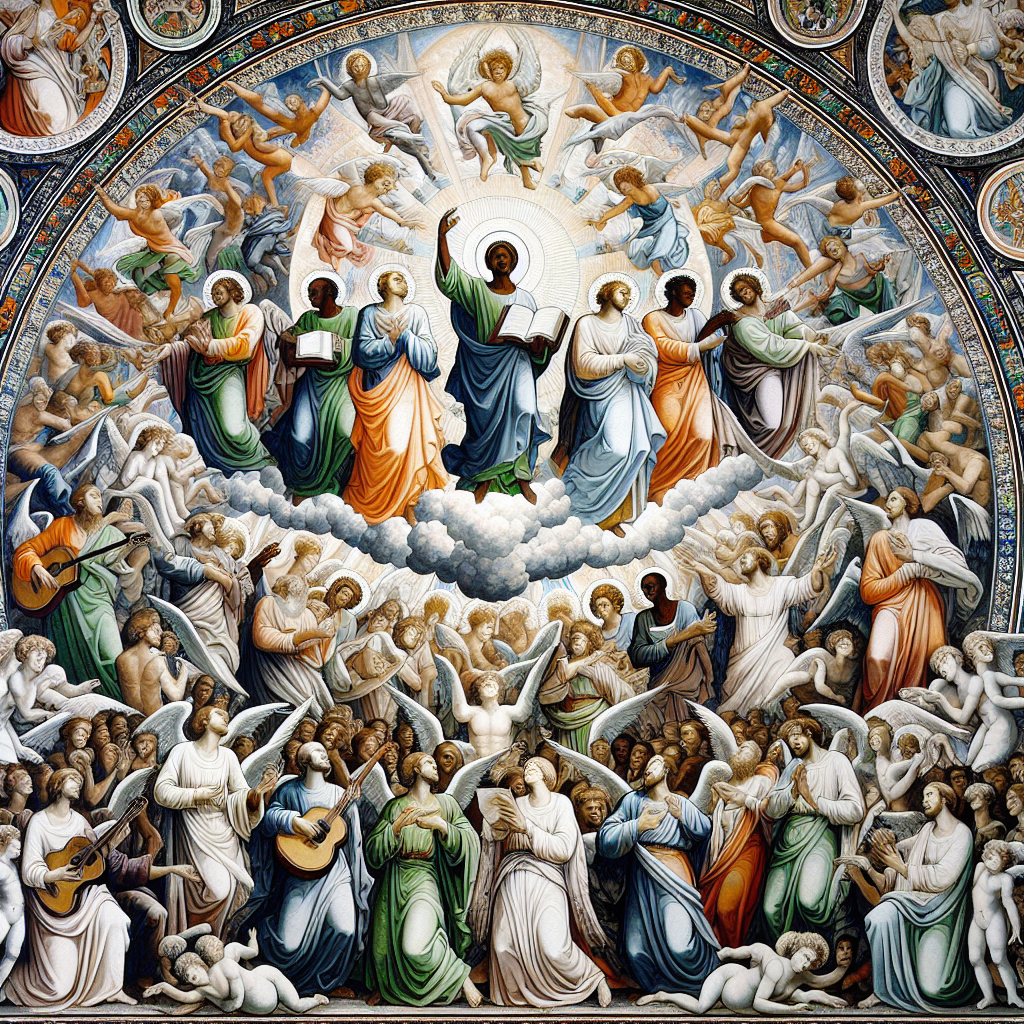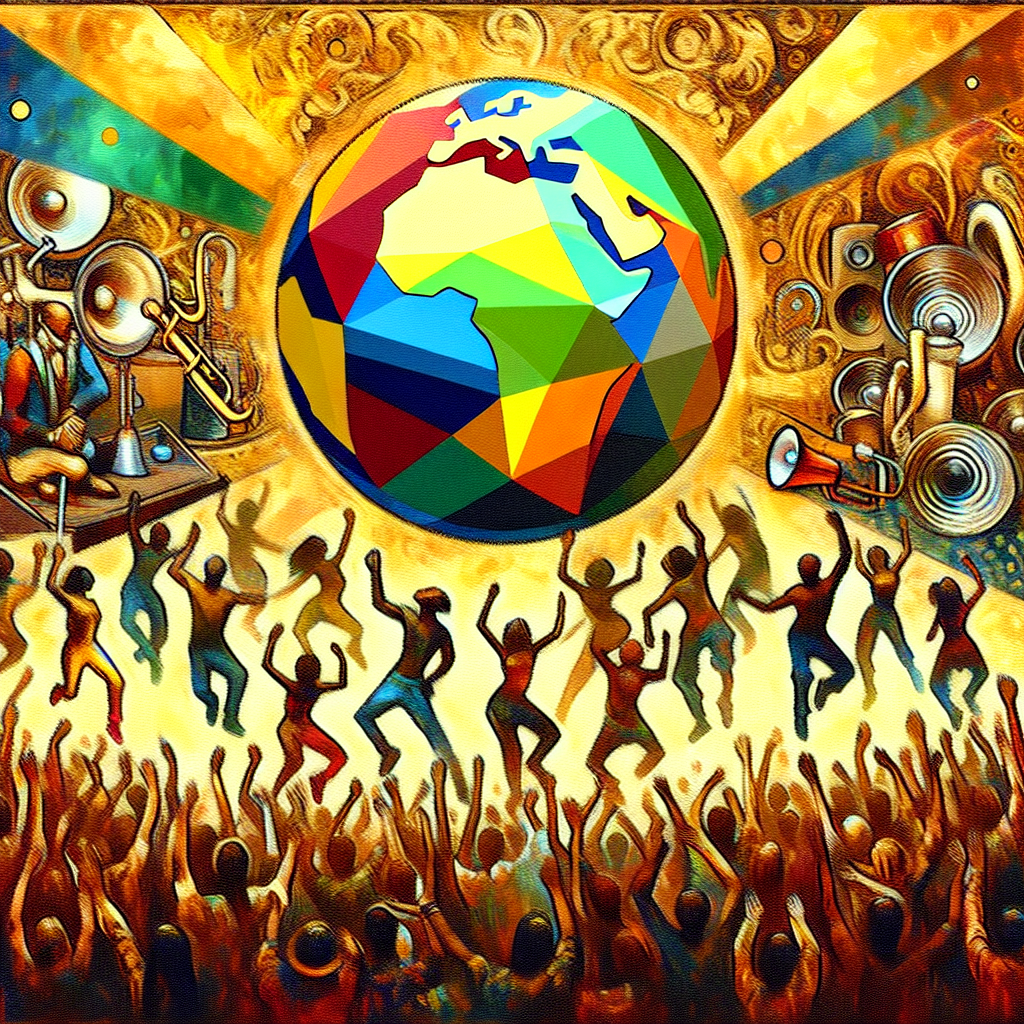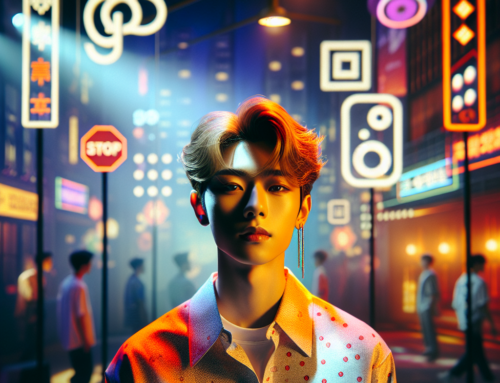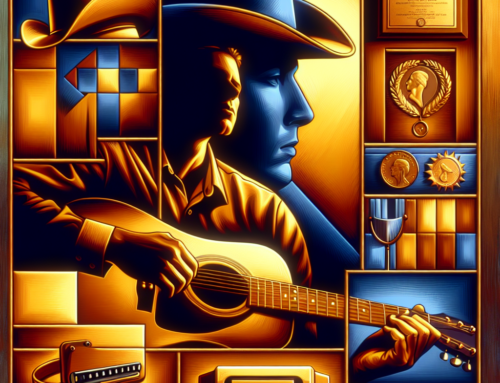-
Table of Contents
- Introduction
- The Evolution Of Afrobeats: From Local Rhythms To Global Phenomenon
- Key Artists Driving The Afrobeats Movement Worldwide
- The Role Of Social Media In The Global Spread Of Afrobeats
- Afrobeats’ Influence On Western Music And Pop Culture
- The Future Of Afrobeats: Trends And Predictions For Global Domination
- Q&A
- Conclusion
“Afrobeats: Pulsating Rhythms, Uniting the World.”
Introduction
Afrobeats, a vibrant and eclectic music genre originating from West Africa, has rapidly ascended to global prominence, captivating audiences worldwide with its infectious rhythms and dynamic fusion of sounds. Rooted in the rich musical traditions of Nigeria and Ghana, Afrobeats blends elements of traditional African music with contemporary influences such as hip-hop, dancehall, and electronic music. This genre is characterized by its pulsating beats, catchy melodies, and lyrical versatility, often addressing themes of love, celebration, and social issues. The global takeover of Afrobeats can be attributed to its universal appeal and the rise of digital platforms, which have facilitated the genre’s dissemination across borders. Artists like Burna Boy, Wizkid, and Davido have become international icons, collaborating with global superstars and performing on prestigious stages worldwide. As Afrobeats continues to evolve and inspire, it not only showcases the cultural richness of Africa but also redefines the global music landscape, fostering a new era of cross-cultural exchange and appreciation.
The Evolution Of Afrobeats: From Local Rhythms To Global Phenomenon
Afrobeats, a genre that has its roots deeply embedded in the rich musical traditions of West Africa, has experienced a remarkable evolution, transforming from local rhythms into a global phenomenon. This genre, which should not be confused with Afrobeat—a style pioneered by the legendary Fela Kuti—emerged in the early 21st century as a fusion of traditional African music with elements of jazz, funk, and highlife. Over the years, Afrobeats has grown to incorporate influences from hip-hop, dancehall, and electronic music, creating a vibrant and eclectic sound that resonates with audiences worldwide.
The journey of Afrobeats from local to global can be attributed to several key factors. Firstly, the rise of digital technology and social media platforms has played a crucial role in the dissemination of Afrobeats music beyond the African continent. Artists like Wizkid, Burna Boy, and Davido have leveraged platforms such as YouTube, Instagram, and Spotify to reach international audiences, breaking geographical barriers that once limited the spread of African music. This digital revolution has allowed fans from all corners of the globe to access and appreciate the infectious rhythms and melodies that characterize Afrobeats.
Moreover, the genre’s global appeal can be linked to its ability to adapt and evolve by incorporating diverse musical influences. Afrobeats artists have collaborated with international stars, blending their unique sound with mainstream pop, hip-hop, and R&B. These collaborations have not only introduced Afrobeats to new audiences but have also enriched the genre, adding layers of complexity and depth to its sound. For instance, the collaboration between Nigerian artist Wizkid and Canadian superstar Drake on the hit single “One Dance” in 2016 marked a significant milestone in Afrobeats’ global journey, topping charts worldwide and bringing the genre into the mainstream consciousness.
In addition to digital platforms and cross-genre collaborations, the global diaspora has played a pivotal role in the spread of Afrobeats. African communities around the world have embraced the genre as a cultural touchstone, organizing events and festivals that celebrate Afrobeats music and dance. These gatherings have not only strengthened the sense of community among the African diaspora but have also served as a gateway for non-African audiences to experience and appreciate the genre. As a result, Afrobeats has become a symbol of cultural pride and identity, resonating with people from diverse backgrounds.
Furthermore, the infectious energy and danceability of Afrobeats have contributed to its widespread popularity. The genre’s upbeat tempo and rhythmic complexity make it a favorite on dance floors across the globe, appealing to a broad demographic. This universal appeal is further enhanced by the genre’s lyrical themes, which often revolve around love, celebration, and resilience, resonating with listeners on a personal level.
In conclusion, the evolution of Afrobeats from local rhythms to a global phenomenon is a testament to the genre’s adaptability, cultural significance, and universal appeal. Through digital platforms, international collaborations, and the support of the global diaspora, Afrobeats has transcended its African origins to become a dominant force in the global music landscape. As the genre continues to evolve and capture the hearts of audiences worldwide, it stands as a powerful example of how music can bridge cultural divides and unite people through shared rhythms and melodies.
Key Artists Driving The Afrobeats Movement Worldwide
Afrobeats, a genre that has its roots deeply embedded in West African music traditions, has seen a meteoric rise in global popularity over the past decade. This vibrant and infectious genre, characterized by its fusion of traditional African rhythms with contemporary sounds, has captivated audiences worldwide. Central to this global takeover are the key artists who have not only pioneered the genre but have also propelled it onto the international stage, each bringing their unique flair and creativity to the music.
One cannot discuss the global impact of Afrobeats without mentioning the contributions of Nigerian artist Wizkid. With his smooth vocals and ability to blend Afrobeats with elements of pop and R&B, Wizkid has become a household name. His collaborations with international artists such as Drake on the hit single “One Dance” have further cemented his status as a global icon. Wizkid’s influence extends beyond music, as he has become a cultural ambassador for Afrobeats, introducing the genre to new audiences and inspiring a new generation of artists.
Similarly, Burna Boy has played a pivotal role in the international expansion of Afrobeats. Known for his distinctive voice and eclectic style, Burna Boy has successfully bridged the gap between African music and the global music scene. His album “African Giant” received critical acclaim and earned him a Grammy nomination, showcasing the genre’s potential to compete on the world stage. Burna Boy’s music often addresses themes of identity and heritage, resonating with listeners across different cultures and further solidifying Afrobeats’ place in the global music landscape.
In addition to these trailblazers, Tiwa Savage has emerged as a leading female voice in the Afrobeats movement. Her powerful vocals and dynamic performances have garnered her a loyal fan base both in Africa and abroad. Tiwa Savage’s collaborations with artists like Beyoncé on “The Lion King: The Gift” album have highlighted her versatility and ability to transcend cultural boundaries. As one of the few female artists at the forefront of the genre, she has paved the way for more women to enter the Afrobeats scene, contributing to its diversity and richness.
Moreover, the influence of artists like Davido cannot be overlooked. With his energetic performances and catchy hooks, Davido has become synonymous with Afrobeats’ infectious sound. His ability to blend traditional African elements with modern production techniques has made his music appealing to a broad audience. Davido’s international collaborations, including tracks with Chris Brown and Nicki Minaj, have further amplified the genre’s reach, demonstrating its universal appeal.
As Afrobeats continues to gain momentum, it is essential to recognize the contributions of these key artists who have driven the movement worldwide. Their innovative approaches and dedication to their craft have not only elevated the genre but have also opened doors for future generations of artists. Through their music, they have created a cultural bridge that connects Africa to the rest of the world, fostering a greater appreciation for the continent’s rich musical heritage. As the genre evolves, it is clear that Afrobeats is not just a passing trend but a powerful force in the global music industry, with these artists leading the charge.
The Role Of Social Media In The Global Spread Of Afrobeats

Afrobeats, a genre that originated in West Africa, has seen a meteoric rise in global popularity over the past decade. This vibrant and rhythmic music style, characterized by its fusion of traditional African sounds with contemporary elements such as hip-hop, dancehall, and electronic music, has captivated audiences worldwide. A significant factor contributing to the global spread of Afrobeats is the role of social media, which has acted as a powerful catalyst in its international proliferation.
Social media platforms have revolutionized the way music is consumed and shared, breaking down geographical barriers and allowing artists to reach audiences far beyond their local markets. In the case of Afrobeats, platforms like YouTube, Instagram, and TikTok have been instrumental in introducing the genre to a global audience. These platforms provide artists with the tools to share their music and connect with fans directly, bypassing traditional gatekeepers such as record labels and radio stations. As a result, artists can cultivate a global fanbase and engage with listeners in real-time, fostering a sense of community and shared experience.
Moreover, the visual nature of platforms like Instagram and TikTok has allowed Afrobeats artists to showcase not only their music but also their vibrant culture and lifestyle. Music videos, dance challenges, and behind-the-scenes content offer fans a glimpse into the world of Afrobeats, creating a more immersive and engaging experience. This visual storytelling is particularly effective in capturing the attention of younger audiences, who are more likely to engage with content that is dynamic and visually appealing.
In addition to providing a platform for artists, social media has also facilitated the discovery and sharing of Afrobeats music among users. Algorithms on platforms like Spotify and YouTube suggest new music based on user preferences, often introducing listeners to Afrobeats tracks they might not have encountered otherwise. This has led to a ripple effect, where a single viral song or dance challenge can quickly gain traction and reach millions of users worldwide. The viral nature of social media content means that a hit song can spread rapidly, transcending cultural and linguistic barriers.
Furthermore, social media has enabled collaborations between Afrobeats artists and international musicians, further amplifying the genre’s reach. High-profile collaborations with artists from the United States, Europe, and Latin America have introduced Afrobeats to new audiences and created cross-cultural musical fusions that appeal to a diverse range of listeners. These collaborations often gain significant attention on social media, generating buzz and increasing the visibility of Afrobeats on a global scale.
While social media has undoubtedly played a crucial role in the global spread of Afrobeats, it is important to acknowledge the genre’s inherent appeal. The infectious rhythms, catchy melodies, and vibrant energy of Afrobeats resonate with listeners across cultures, making it a natural fit for the global music landscape. Social media has simply accelerated the process, providing a platform for the genre to flourish and reach its full potential.
In conclusion, the role of social media in the global spread of Afrobeats cannot be overstated. By providing artists with the tools to share their music and connect with fans worldwide, social media has facilitated the genre’s rise to international prominence. As Afrobeats continues to captivate audiences around the globe, it is clear that social media will remain a vital component in its ongoing evolution and success.
Afrobeats’ Influence On Western Music And Pop Culture
Afrobeats, a genre that originated in West Africa, has seen a meteoric rise in global popularity over the past decade, significantly influencing Western music and pop culture. This genre, characterized by its fusion of traditional African rhythms with contemporary sounds, has captivated audiences worldwide, leading to a cultural exchange that is reshaping the music industry. As Afrobeats continues to gain traction, its impact on Western music is becoming increasingly evident, with artists and producers drawing inspiration from its infectious beats and vibrant energy.
One of the most notable aspects of Afrobeats’ influence on Western music is the genre’s ability to transcend cultural and linguistic barriers. Artists such as Wizkid, Burna Boy, and Davido have become household names, collaborating with Western musicians and bringing their unique sound to a broader audience. These collaborations have not only introduced Afrobeats to new listeners but have also encouraged Western artists to experiment with the genre’s distinctive elements. For instance, Drake’s hit song “One Dance,” which features Nigerian artist Wizkid, seamlessly blends Afrobeats with dancehall and pop, creating a sound that resonates with diverse audiences.
Moreover, the influence of Afrobeats extends beyond individual collaborations, as it has also inspired a shift in the production styles of Western music. Producers are increasingly incorporating Afrobeats’ rhythmic patterns and instrumentation into their work, resulting in a fresh and dynamic sound that appeals to a global audience. This trend is evident in the rise of songs that feature syncopated beats, layered percussion, and melodic hooks reminiscent of Afrobeats. Consequently, the genre’s influence is not only shaping the sound of contemporary music but also challenging traditional notions of genre boundaries.
In addition to its impact on music, Afrobeats has also permeated various aspects of pop culture, including fashion, dance, and social media. The genre’s vibrant and energetic aesthetic has inspired fashion trends that celebrate African heritage and creativity. Designers and brands are increasingly incorporating African prints, patterns, and styles into their collections, reflecting the growing appreciation for African culture in the global fashion industry. Similarly, Afrobeats has popularized dance styles that emphasize fluidity and rhythm, with viral dance challenges on platforms like TikTok and Instagram showcasing the genre’s influence on global dance culture.
Furthermore, Afrobeats has played a significant role in fostering a sense of cultural pride and identity among African diaspora communities. As the genre gains international recognition, it has become a powerful tool for cultural expression and representation, allowing individuals to connect with their roots and share their heritage with the world. This cultural exchange has not only enriched the global music scene but has also contributed to a broader understanding and appreciation of African culture.
In conclusion, Afrobeats’ influence on Western music and pop culture is undeniable, as it continues to shape the sound and aesthetics of contemporary music. Through collaborations, production styles, and cultural trends, Afrobeats has transcended geographical boundaries, fostering a global appreciation for its unique sound and vibrant energy. As the genre continues to evolve and gain momentum, its impact on the music industry and pop culture will likely endure, paving the way for further cultural exchange and innovation.
The Future Of Afrobeats: Trends And Predictions For Global Domination
Afrobeats, a genre that has its roots deeply embedded in West African music traditions, has been making waves on the global stage, capturing the hearts of audiences worldwide. As it continues to gain momentum, the future of Afrobeats looks promising, with several trends and predictions indicating its potential for global domination. The genre’s infectious rhythms, vibrant melodies, and unique blend of traditional African sounds with contemporary influences have contributed to its widespread appeal. This fusion of elements has not only attracted a diverse audience but also inspired artists from various musical backgrounds to incorporate Afrobeats into their work, further amplifying its reach.
One of the key trends driving the global takeover of Afrobeats is the increasing collaboration between African artists and international musicians. These partnerships have resulted in chart-topping hits that have introduced Afrobeats to new audiences and expanded its influence beyond the African continent. For instance, collaborations between Nigerian artists like Burna Boy, Wizkid, and Davido with global superstars such as Beyoncé, Drake, and Ed Sheeran have played a significant role in elevating the genre’s profile. As these collaborations continue to flourish, they are likely to pave the way for more cross-cultural exchanges, enriching the global music scene and solidifying Afrobeats’ position on the world stage.
Moreover, the rise of digital platforms and social media has been instrumental in the dissemination of Afrobeats music. Streaming services like Spotify, Apple Music, and YouTube have made it easier for fans around the world to access and discover new Afrobeats tracks, while social media platforms have provided artists with a direct channel to engage with their audience. This digital revolution has democratized the music industry, allowing Afrobeats artists to reach a global audience without the need for traditional gatekeepers. As technology continues to evolve, it is expected that these platforms will further enhance the visibility and accessibility of Afrobeats, contributing to its sustained growth and popularity.
In addition to technological advancements, the increasing presence of Afrobeats at international music festivals and award shows is another indicator of its global impact. Events such as Coachella, Glastonbury, and the BET Awards have featured performances by Afrobeats artists, showcasing the genre’s dynamic energy and captivating performances to diverse audiences. These platforms not only provide exposure but also validate Afrobeats as a significant and influential genre in the global music landscape. As more festivals and award shows embrace Afrobeats, it is anticipated that the genre will continue to gain recognition and respect on a global scale.
Furthermore, the cultural significance of Afrobeats cannot be overlooked. The genre serves as a powerful vehicle for storytelling, addressing social issues, and celebrating African identity and heritage. This cultural resonance has endeared Afrobeats to audiences who appreciate its authenticity and the stories it tells. As the world becomes more interconnected, there is a growing appetite for diverse and authentic cultural expressions, positioning Afrobeats as a genre that not only entertains but also educates and inspires.
In conclusion, the future of Afrobeats is bright, with several trends and predictions pointing towards its continued global domination. Through strategic collaborations, the power of digital platforms, increased visibility at international events, and its cultural significance, Afrobeats is poised to leave an indelible mark on the global music industry. As it continues to evolve and adapt, the genre is set to captivate even more audiences, solidifying its place as a dominant force in the world of music.
Q&A
1. **What is Afrobeats?**
Afrobeats is a music genre that originated in West Africa, particularly Nigeria and Ghana, in the early 2000s. It blends elements of traditional African music with global genres like hip-hop, dancehall, and electronic music, characterized by its rhythmic beats and catchy melodies.
2. **Who are some key artists in the Afrobeats genre?**
Key artists in the Afrobeats genre include Burna Boy, Wizkid, Davido, Tiwa Savage, and Yemi Alade. These artists have played significant roles in popularizing Afrobeats on the global stage.
3. **How has Afrobeats influenced global music?**
Afrobeats has influenced global music by introducing its unique sound and rhythm to international audiences, leading to collaborations with mainstream artists like Drake, Beyoncé, and Ed Sheeran. Its infectious beats have also inspired new music styles and trends worldwide.
4. **What role has social media played in the global takeover of Afrobeats?**
Social media platforms like Instagram, TikTok, and YouTube have been crucial in the global spread of Afrobeats. They allow artists to reach international audiences directly, while viral dance challenges and music videos help popularize songs across different cultures.
5. **What impact has Afrobeats had on the music industry?**
Afrobeats has significantly impacted the music industry by diversifying the global music scene and increasing the representation of African artists on international charts and award platforms. It has also opened up new markets and opportunities for cross-cultural collaborations.
Conclusion
Afrobeats, a genre that originated in West Africa, particularly Nigeria, has experienced a remarkable global takeover in recent years. Its infectious rhythms, vibrant melodies, and fusion of traditional African sounds with contemporary music elements have captivated audiences worldwide. Artists like Burna Boy, Wizkid, and Davido have played pivotal roles in bringing Afrobeats to the international stage, collaborating with global stars and performing at major music festivals. The genre’s appeal lies in its ability to transcend cultural boundaries, offering a fresh and dynamic sound that resonates with diverse audiences. As streaming platforms and social media continue to break down geographical barriers, Afrobeats’ influence is set to expand even further, solidifying its place as a dominant force in the global music industry. This global embrace of Afrobeats not only highlights the genre’s universal appeal but also underscores the growing recognition and appreciation of African culture and creativity on the world stage.




